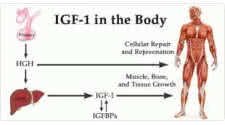IGF-1 - Relation to Level with Mental Function

Growth Hormone & IGF Res, 15: 416-422, 2005
Growth hormone (GH) levels and its metabolic partner IGF-1 decrease progressively with age. Daily GH release is 2.000 micrograms (mcg) at age 10, but decreases to 700mcg per day at age 20, 400mcg at age 30, 325mcg at age 40 and 225mcg at age 80. Low GH release is linked to reduced
mental function that often occurs with age.
In a meta-analysis (pools the results of many studies), Dutch scientists concluded that IGF-1 levels were highly related to brain function in older adults. Older people with low levels of IGF-1 tended to perform poorly on tests of memory, information processing, verbal tests,
mental acuity and the Mini Mental State Examination widely used method for assessing cognitive mental status).
Studies in humans and animals suggest that GH supplementation may reverse mental deterioration that occurs with age. The number of brain cells are relatively constant throughout life, but the connections between them, which determine mental acuity, decline with age. Preserving
GH and IGF-1 levels protect brain cells and nerve connections, which help maintain mental ability throughout life.